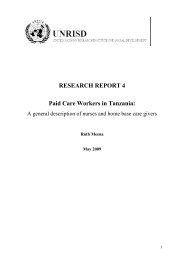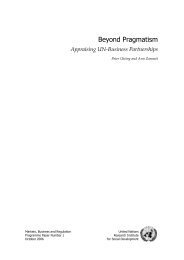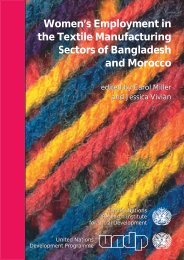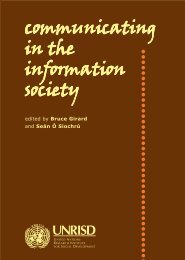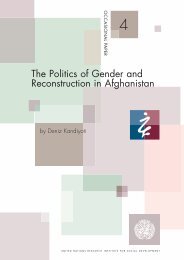Environmental Degradation and Social Integration - United Nations ...
Environmental Degradation and Social Integration - United Nations ...
Environmental Degradation and Social Integration - United Nations ...
Create successful ePaper yourself
Turn your PDF publications into a flip-book with our unique Google optimized e-Paper software.
scientific community, political parties <strong>and</strong> the media.<br />
Wider Level Responses<br />
<strong>Environmental</strong> degradation places stress not only on community level social structures, but also on<br />
societal institutions which function at a broader level. The social changes brought about by<br />
individual responses to environmental damage modify the balance of rural-urban relations, <strong>and</strong><br />
increase the contact—<strong>and</strong> sometimes the competition <strong>and</strong> conflict—between different ethnic<br />
groups or cultural traditions. The state faces new dem<strong>and</strong>s <strong>and</strong> new challenges as a result of these<br />
changes.<br />
<strong>Environmental</strong> degradation also sometimes triggers new forms of organization at the regional,<br />
national or international level. Regional coalitions may form in response to a perceived<br />
environmental threat. At times, greater reliance is placed on state powers to regulate environmental<br />
activities. In addition, completely new forms of social organization, including non-governmental<br />
organizations <strong>and</strong> broad-based social movements, are increasingly being established as a<br />
consequence of environmental damage or environmental concerns.<br />
The perceived threat of environmental degradation has also helped to create an international<br />
ideology of conservation, which has helped to forge links <strong>and</strong> alliances between previously<br />
unconnected groups—between Northern middle class groups <strong>and</strong> Southern indigenous peoples, for<br />
instance. In some cases, the threat of environmental degradation has led to greater visibility of, <strong>and</strong><br />
increased sympathy for, the livelihood concerns of such groups. In other cases, however, the<br />
impacts of conservation projects have been disastrous for local people (see box 6).<br />
The recent <strong>United</strong> <strong>Nations</strong> Conference on Environment <strong>and</strong> Development, which was preceded by<br />
more than two decades of international work on environment, was an institutionalized global<br />
response to problems of environment <strong>and</strong> development. As is inevitable with such meetings, the<br />
UNCED process left many people dissatisfied. For those who believe that consumption patterns in<br />
the North are the root cause of environmental degradation, the meeting changed little: as then-<br />
President Bush remarked, “the life style of the U.S. would not be up for discussion at Rio”, <strong>and</strong><br />
indeed it was not. 15<br />
In addition, many people, especially from the South, viewed with suspicion UNCED’s emphasis on<br />
the “management” of “our common resources”, noting that such terminology indicates the North’s<br />
appropriation of the right to make decisions regarding the resources of the South, while making few<br />
concessions of its own: it has been claimed that what the North was saying at UNCED, in effect,<br />
was that “what’s yours is mine, what’s mine is mine”. 16<br />
Others were much more optimistic about the UNCED conference, believing that it was an<br />
important step which may lead to more substantial international agreements in the future. While<br />
some countries of the South see environmental regulation as a luxury they cannot afford, in fact the<br />
absence of internationally agreed environmental st<strong>and</strong>ards, enforced at the national level, is<br />
generally detrimental to developing countries. It allows transnational industries to use the threat of<br />
relocation to win concessions on national environmental st<strong>and</strong>ards. It is the poorest countries that<br />
are most vulnerable to such manipulation, <strong>and</strong> the poorest people within these countries who are the<br />
worst affected by both everyday pollution <strong>and</strong> environmental disasters.<br />
Box 6: Protected Areas <strong>and</strong> Indigenous Peoples 17




